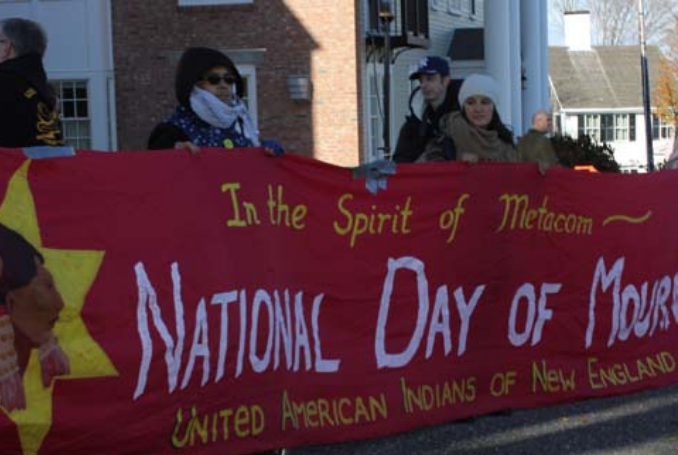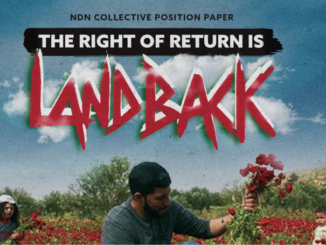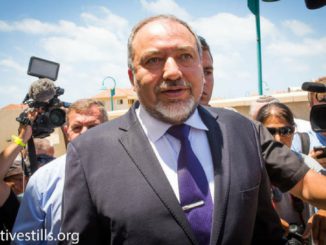
By Benay Blend
In November 2018 Nick Estes of The Red Nation—Albuquerque invited friends to a pot-luck and teach-in that was to be an alternative to the “genocidal” holiday of Thanksgiving. Modeled on the National Day of Mourning, it sought to replace the commemoration of what was, in reality, the slaughter of more than 700 Pequot women, children, and men by English settlers in Plymouth, Massachusetts.
In order to sum up the spirit of the day, Estes quotes Moonanum James, a Wampanoag co-leader of the United American Indians of New England (UAINE), who spoke at the 2017 Day of Mourning:
“The pilgrims did not find an empty land any more than Columbus “discovered” anything. Every inch of this land is Indian land. The pilgrims (who did not even call themselves pilgrims) did not come here seeking religious freedom; they already had that in Holland. They came here as part of a commercial venture.
They introduced sexism, racism, anti-lesbian and gay bigotry, jails, and the class system to these shores. One of the very first things they did when they arrived on Cape Cod—before they even made it to Plymouth—was to rob Wampanoag graves at Corn Hill and steal as much of the Indians’ winter provisions as they were able to carry.
They were no better than any other group of Europeans when it came to their treatment of the Indigenous peoples here. And no, they did not even land at that sacred shrine down the hill called Plymouth Rock, a monument to racism and oppression.”
It is partly because of these ideals of settler colonialism and racial capitalism that there will be a different kind of Thanksgiving gathering in November 2020—alternative or otherwise—due to the rampant spread of the coronavirus across the country. While the current administration denies the seriousness of the situation, placing corporate profits above human lives, many individuals follow this lead by refusing to take precautions, believing that it is their right to place their individual needs above the good of the community.
Nevertheless, this holiday season arrives during a national struggle over racial justice, and a pandemic that has been particularly injurious to marginalized communities of color.
It is no accident that South Dakota has the country’s highest Covid-19 positivity rate while North Dakota has experienced an extremely high per capita mortality. In an interview with Democracy Now’s host Amy Goodman, Jodi Archambault of the Standing Rock Sioux Tribe explains how South Dakota Republican governor Kristi Noem, in particular, has made it difficult for Indigenous people by attempting to withhold funds for tribal communities who take precautions to protect their health.
This situation is especially dire because the most vulnerable are elders who are responsible for passing on languages and culture to younger tribal members. Moreover, North Dakota governor Doug Burgum has requested that medical staff who test positive continue to work, thus putting patients and other workers at risk. As Archambault explains,
“…the business of the hospital is asking for this kind of, I guess, allowance, to allow sick people without symptoms to come and spread? But actually, this has always — the situation that we’re talking about is the lack of compassion for those elders, not just Native elders, but all elders, all people with underlying health conditions, like cancer. It is an absolute choice, a clear choice, to choose profit over people. So, the governor isn’t putting people first; he’s putting profit first.”
Despite tribal roadblocks meant to keep outsiders off of Native land, despite the refusal of nurses to return to work while sick, the virus is still spreading on reservations because of commerce that continues across borders. While the original Thanksgiving involved European colonizers, who traveled across the sea, this year sees a continuance of this border crossing that repeats the placing of commercial interests above that of Indigenous people’s lives.
In the desert Southwest, as in much of tribal land, there are similar dynamics that have caused another surge of cases, and this after the people had worked hard to control the transmission of the virus. According to Allie Young of the Navajo Nation and founder of Protect the Sacred, several factors led to this current crisis. Lack of medical equipment and volunteers existed before the virus, but now are made worse by the epidemic.
Trump rallies in border towns, where Navajo people shop, have also impacted the Nation. “We have to travel to these territories” Young states, “where they’re not thinking about — they’re not wearing masks, and they’re not thinking about their neighbors who have been impacted.”
Adding to this toxic mix, continues Young, many people have underlying conditions due to years of mineral extraction on tribal land.
“For 30-plus years, we had Peabody up in the northwestern region of Navajo Nation, which was our hot spot within the nation. And a lot of our people up there — the waters and our lands are contaminated by uranium. And our elders had to work through — and even my own uncles — you know, they just shut down last year, in 2019.”
Because many people worked and now live on these contaminated lands, they are particularly vulnerable to the virus.
All of these examples represent a repeat—or perhaps a continuance—of the original genocide of Native people by European invaders who then settled on stolen land.
Nevertheless, writes Nick Estes, “it is not enough to talk only of borders. Empire reaches beyond them.” Israelis, too, are committing genocide on stolen land, aided and abetted by Trump’s policies, though the president is only acting like those before and most likely after him.
“One hundred years ago, in what is now known as the ‘Middle East,’” writes Elena Ortiz (Ohkay Owingeh), “Europeans drew lines on paper and called them borders. America has enforced those borders with military aid in the form of troops, weapons and obscene amounts of money.”
“It is unconscionable that ‘liberal’ Americans can be so justifiably enraged that immigrant children are kept in cages at the U.S. border,” Ortiz continues, “but stay silent at Palestinian children being prosecuted and imprisoned in their own homelands.”
Moreover, Palestinians, like the Indigenous in the United States, have suffered unduly from the virus. As occupied people, they, too, had “underlying conditions” when the pandemic hit.
In the year of the coronavirus, when Americans mourn that their celebrations will be missing extended family members and friends, due either to their deaths or restrictions put in place to prevent more deaths, it would be good to remember that the original settlers were uninvited guests, intruding on land which they would steal from its inhabitants.
Refusing to tell the real story of Thanksgiving implies committing genocide again. By erasing the history of Indigenous people—whether Native American or Palestinian—we side with the oppressor who wants to literally remove the people who are native to the land.
“We talk about the history because we must,” said Mahtowin Munro (Wampanoag), a co-organizer for the 50th National Day of Mourning in 2019. “The focus is always on the Pilgrims. We’re just going to keep telling the truth,” she continued. “More and more non-native people have been listening to us. They’re trying to adjust their prism.”
Shortly after the National Day of Mourning, but in the same spirit of resistance, Palestine Writes Literature Festival (December 2-6, 2020) will take place on a virtual platform that seeks to bring the experience to a broader audience. Challenging censorship of Palestinian speech, Palestine Writes celebrates “art, literature, and the intersections between culture, struggle, and politics.”
By highlighting art and literature, past and present, the festival hopes to cut through a mythology similar to that which Indigenous historian and activist Roxanne Dunbar-Ortiz charges with standing in the way of social change in the States. Easier said than done, “this is …nationalism,” she declares.
“It’s actually—Americanism is white supremacy and represents negative things. There is almost no way to reconcile it,” she concludes. “It simply has to be deconstructed and faced up to,” in a manner very much like Zionism, its relevant to add, as it operates in a similar way.
– Benay Blend earned her doctorate in American Studies from the University of New Mexico. Her scholarly works include Douglas Vakoch and Sam Mickey, Eds. (2017), “’Neither Homeland Nor Exile are Words’: ‘Situated Knowledge’ in the Works of Palestinian and Native American Writers”. She contributed this article to The Palestine Chronicle.

– Benay Blend earned her doctorate in American Studies from the University of New Mexico. Her scholarly works include Douglas Vakoch and Sam Mickey, Eds. (2017), “’Neither Homeland Nor Exile are Words’: ‘Situated Knowledge’ in the Works of Palestinian and Native American Writers”. She contributed this article to The Palestine Chronicle.







